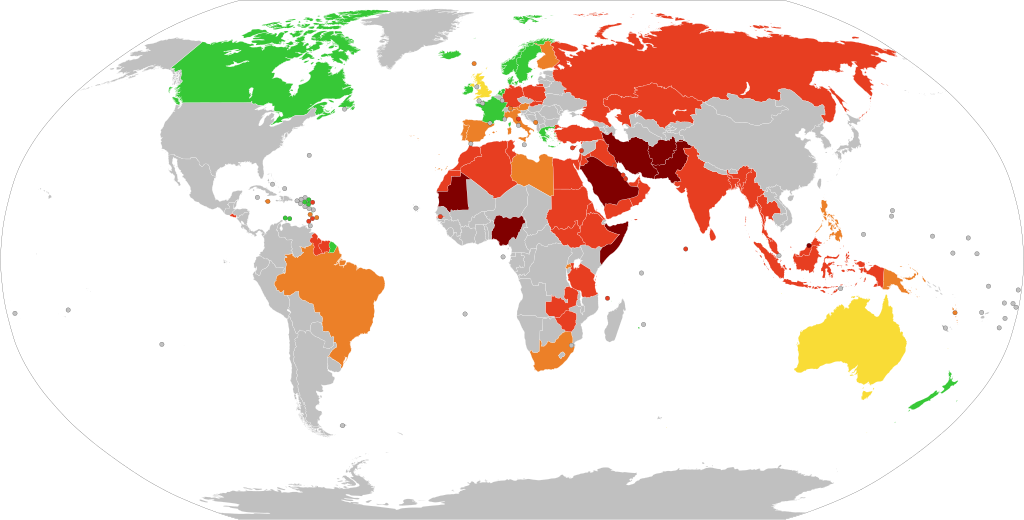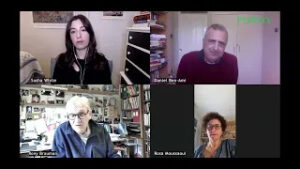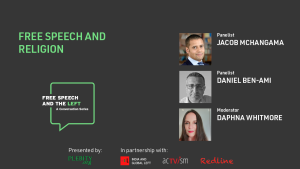
No blasphemy law Repealed Local restrictions Fines and restrictions Prison sentences Death sentences
Conquistador, Blasphemy laws worldwide, CC BY-SA 4.0
Note: Sadly, this article is posted on the day that Salman Rushdie has been attacked and is currently in the hospital – his status unknown. The issue of blasphemy is unfortunately still very much with us.
On June 6, 1765, a religious procession wound its way through the streets of the small French city of Abbeville. Three young men crossed paths with the procession, a fatal encounter that led to the arrest of all three and the eventual trial and execution of one of them. Francois Jean Lefebvre, known as le Chevalier de la Barre, was 21 years old at the time of his arrest. His crime—singing some drunken disrespectful songs, crossing paths with the religious procession and not taking off his hat as it passed. He was tried, convicted of blasphemy and sentenced to death. After a failed appeal for clemency to the King, Louis XV, the sentence was carried out. La Barre was tortured, beheaded and his body burned. La Barre was the last person condemned for blasphemy in France.
The story of ‘le Chevalier de la Barre’ is known to us largely because of Voltaire, champion of the enlightenment, who wrote extensively about the case and whose semi-forbidden work, the Dictionnaire Philosophique was found among the young man’s possessions and burned along with his decapitated body.
In the West, we often think that the right to question religious authority is a battle that was won long ago. Most people think it’s at best an anachronism in today’s world. But it wasn’t so long ago that questioning church canon could lead to arrest, torture and a painful, fiery death.
The pain isn’t over. As recently as 2019, according to a Pew Research survey, 40% of the countries of the world, or 79 countries, still had blasphemy laws on the books. Seven countries still have death penalties for blasphemy—Afghanistan, Brunei, Iran, Mauritania, Nigeria, Pakistan and Saudi Arabia.
“Apostasy and blasphemy may seem to many like artifacts of history. But in scores of countries around the world, laws against apostasy and blasphemy remain on the books – and many are enforced to various degrees.” –Pew Research
Blasphemy laws and all speech laws are a double edged sword
Just this year, in Finland, a Christian member of parliament was prosecuted for tweeting that homosexuality is a sin. Her speech crime was citing the bible.
There may be no shortage of very nasty references in the bible. But if you are cheering for the outcome in that case, you should realize that these speech laws are not invoked to prevent only bigots from expressing their bad ideas. They have also been used against LGBTQ activists, for example in Poland in 2021:
“…three lesbian, gay, bisexual, transgender, and intersex (LGBTI) activists faced charges in January for “offending religious feelings” by displaying posters depicting the Virgin Mary with a rainbow halo.“
Left vs Church
The story of progressive values at odds with the entrenched power of the Church is encyclopedic in scope. But even a glance at the story provides a clear picture of this struggle. A developing view that sought to address the ills of the common people in concrete and immediate ways was at odds with the entrenched hierarchical structure and hoarded wealth of the religious establishment. That establishment used all of its powers to prevent the spread of what it considered dangerous speech.
In fact, what progress would be possible under a religious regime that unleashed draconian punishments for saying the earth was round, or that humans evolved through evolution?
Blasphemy may not be high on the current list of liberal-left concerns, but the status quo could never have been challenged without a long painful struggle based around freedom of expression, from the Paris Commune of 1871 to the Comstock Laws of post civil war U.S., or the Civil Rights Movement of the 60s, as well as every other progressive struggle in history.
Blasphemy is a crystallized version of every free speech issue
How many historical examples do we need before we feel a little humility over our ability to distinguish between what is righteous and what is heinous; what should be published and shared versus what should be forbidden and suppressed?
One person’s blasphemy is another person’s creed
Blasphemy is just one example of criminalization of speech. But it is useful to look at it closely because it serves up all the issues in a crystallized form, issues that apply to all speech laws.
Think for a moment about how the same words can literally have opposite effects depending on who is speaking them and who is receiving them. For example, consider how devout Christians might receive the news from an orthodox Jew that the Messiah has not yet arrived.
Many religions consider blasphemy to be the most dangerous of all speech, and historically it has even been worthy of the death penalty—in some parts of the world it still is. But the identical words can be blasphemy to the faithful of one religion and at the same time the expression of the most cherished creeds for another.
Blasphemy is based on the idea that one side knows the truth and will decide for everyone what should be allowed
Blasphemy laws are based on the idea that there is a single position of truth that cannot be challenged. All speech restrictions are based on this same idea whether it’s made explicit or not.
Whenever speech is restricted for whatever the reason, it always raises the question as to who will decide what is or isn’t acceptable. The same speech may express one person’s feelings but hurt or even insult someone else. Who sits in a position of knowing the absolute truth that allows them to decide for everyone?
Our views of the world evolve
Voltaire was a complicated man…out of favor now among many people on the left. He was a champion of tolerance and liberty as well as a racist and ‘judeophobe’ (before the word antisemite existed). Human progress, as morally poor as it is technologically rich, is based on imperfect humans who struggle in the context of their times.
Allowing free speech doesn’t mean that the best ideas win out, just that the free exchange of ideas is essential
While some restrictions on speech will always be necessary, we must learn to set the bar very high, high enough to recognize that people can have opposing views, and each might consider the other’s words hateful. What we think of as indisputable truth today can change as social consensus evolves.
To reject free speech as an outmoded and inherently right wing posture is a sad mistake that goes against a long history of new ideas challenging established power. To adopt the belief that unlike any previous generation we have attained a godlike understanding of truth is an arrogant and dangerous mistake.
Free speech and the free exchange of ideas remain the essential ingredients for challenging all forms of totalitarianism and for advancing the causes of social justice and human dignity.



